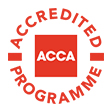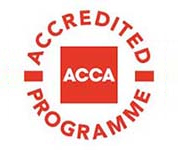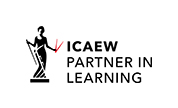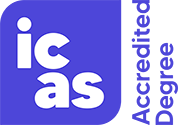Start date:
Course information
Typical offer ABB
UCAS code 72N7
Institute code L34
Taught by School of Business

10th in the UK for Finance (The Daily Mail University Guide 2026)

Accredited by ACCA

Accredited by ICAEW

Accredited by CIMA

Accredited by ICAS
Course description
Course description
Our BSc in Accounting and Finance will provide you with a solid foundation and technical skills in accounting and finance. We will help you to develop quantitative, communications and information technology skills and the ability to apply these skills in an accounting and finance context. You will learn how managers, shareholders and other stakeholders make decisions in organisations.
Our accounting degrees offer you the opportunity to gain exemptions from the accounting and management accounting professional bodies, ACCA, CIMA, ICAEW and ICAS, dependent on satisfactory completion of certain modules.
We will prepare you for a career or further training opportunities in the accounting and finance professions - in the public and private sectors or in voluntary organisations.
An optional year studying abroad or undertaking an industry placement will enhance your skills and build your professional network. If you are interested in postgraduate study, this course will prepare you for the increasingly independent aspects of further study and research.
The first year of this degree is shared with the Accounting BSc and Finance BSc, which means you will have the option to switch to this degree at the end of your first year.
Entry requirements
Entry requirements
- A/AS-levels: ABB. All subjects accepted. Two AS-levels may be considered in place of one A-level.
- EPQ with A-levels: BBB + EPQ at grade B.
- GCSE: Maths at grade 5/B plus English Language at grade 4/C.
- Access to HE Diploma: Pass relevant diploma with 45 credits at Level 3, including 30 credits at Distinction.
- International Baccalaureate: Pass Diploma with 30 points overall including a minimum of grade 4 in SL/3 in HL Maths Analysis and Approach, or grade 5 in SL Maths/4 in HL Application and Interpretation if not held at GCSE grade 5/B. Must include minimum of grade 4 in English A or 5 in English B if grade 4/C not held in English Language GCSE.
- BTEC National Extended Diploma: DDD in Business (plus GCSE Maths grade 5/B and English language at grade 4/C)
- T Levels: Distinction in either: Accounting or Finance (plus GCSE Maths grade 5 and English language at grade 4)
Other official national and international qualifications considered from across the world. You can review some of the qualifications we accept on our countries page and English Language equivalencies.
If your qualification or country is not listed, please contact us for more information, including the name and result of the qualification you have studied.
Second Year Entry may be possible with suitable qualifications.
Flexible entry requirements
We welcome applications from motivated students whose predicted grades are slightly below our standard entry requirements. We understand that predicted grades are not always an accurate reflection of your final results, and we’re happy to consider your application. Although we can’t guarantee an offer due to the high volume of applications, if you’re eligible, we may still offer you a place based on our standard requirements.
Contextual offers
The University of Leicester is committed to providing equitable opportunities for all applicants from all backgrounds. We make contextual offers to support students who may be impacted by the area they live in, their personal circumstances or who have completed one of our progression programmes. These offers are usually one or two grades lower than the standard entry requirements. To qualify for a contextual offer, you must apply for an eligible course and meet specific criteria – check if you’re eligible.
Selection process
When considering your application, we will look for evidence that you will be able to fulfil the objectives of the course and achieve the standards required. We will take into account a range of factors including previous exam results.
Applicants are not normally interviewed. If you receive an offer you will be invited to visit the School of Business.
English Language Requirements
IELTS 6.5 or equivalent. If your first language is not English, you may need to provide evidence of your English language ability. If you do not yet meet our requirements, our English Language Teaching Unit (ELTU) offers a range of courses to help you to improve your English to the necessary standard.
International Qualifications
Find your country in this list to check equivalent qualifications, scholarships and additional requirements.
Countries ListFees and funding
Fees and funding
UK Students
Starting in 2026
- £9,790 in your first year, subject to Parliamentary approval.
- For the 2027/28 academic year, the Home UK tuition fee is expected to be £10,050, subject to Parliamentary approval. Further increases are anticipated to be implemented automatically through government legislation, therefore it is likely that your tuition fees will rise for each subsequent year of your studies.
Find out more about tuition fees, including year abroad, placement years, scholarships and funding.
International Students
Starting in 2026
- £20,200 per year
If you are resident outside the UK and the Republic of Ireland, you will need to pay a deposit to secure your place. This will be subtracted from your total tuition fee.
Find out more about tuition fees, including year abroad, placement years, scholarships and funding.
Accreditation
Accreditation
This course holds exemption accreditation with leading global professional bodies. Being awarded exemptions helps increase your employability prospects with potential employers and also means you are exempt from some professional examinations in the first few years after your graduate.
ACCA (Association of Chartered Certified Accountants)
ACCA are the global body for professional accountants. We hold exemptions for five of their professional accountancy examinations.
CIMA (Chartered Institute of Management Accountants)
CIMA is the professional body of management accountants. We hold exemptions for eight of their professional accountancy examinations.
ICAEW (Institute of Chartered Accountants of England and Wales)
ICAEW is a world-leading professional membership organisation that promote, develop and support chartered accountants and students. We have exemptions for seven of their professional accountancy examinations.
ICAS (Institute of Chartered Accountants of Scotland)
ICAS is the global professional body for Chartered Accountants. We hold exemptions for two of their professional accountancy qualifications.
Some of the exemptions are subject to the satisfactory completion of the specific modules on our course.




Careers and employability
Careers and employability
Whether you want to reach the top in an organisation, start your own business or make a difference in the voluntary sector, there are specially designed programmes and activities at Leicester that will support you in gaining the right skills, experiences and exposures you need. Employability is embedded in our courses with all offering a year in industry opportunity. In addition, the School of Business has a dedicated Careers Team who work to make sure you get support to achieve your aspirations.
Graduate destinations
Our accounting and finance graduates have gone onto work for employers such as:
- Santander
- PWC
- Virgin Media
- Deutsche Bank
- JP Morgan
- KPMG
- Deloitte
Naomi graduated with a degree in Accounting and Finance. While at Leicester Naomi took advantage of the support available, including the Careers and Employability Service, which helped her clinch a place on her first choice graduate scheme at KPMG.
Careers and Employability Service
Get career-ready at Leicester with guidance from our award-winning Careers and Employability Service. We're here to give you a lifetime offer of support, even after graduation. Our team of specialist careers advisers and mentors will help you every step of the way. From supporting you with CVs and interviews, to volunteering opportunities and placements, we're here to help you reach your professional goals.
Related courses
Related courses
Sustainable Development Goals
Sustainable Development Goals
We are committed to providing skills and knowledge to help prepare you tackle global challenges. We have mapped our undergraduate degrees for learning which aligns to the 17 UN Sustainable Development Goals.
This degree includes learning which relates to the following UN Sustainable Development Goals:
- Goal 8: Decent work and economic growth
- Goal 16: Peace, Justice and Strong institutions
- Goal 17: Partnerships for the goals
Course structure
Year 1
Year 1
In your first year you will learn about the foundations of finance, accounting, management and economics and begin to acquire the basic statistical skills to prepare you for your dissertation in your final year. The modules that you take this year will provide you with a solid base for the more specialised modules of the second and third years.
Modules
- Study Skills and Quantitative Methods
- Financial Accounting
- Economics for Accounting and Finance
- Management for Accounting and Finance
- Law and Ethics for Accounting and Finance
- Business Analytics
- Introduction to Management Accounting
- Introduction to Finance
This is the same first year as the Accounting BSc and Finance BSc so it is possible for you to transfer to either of these courses at the end of your first year.
The modules listed reflect those currently available to students. Every year, we review our modules and their content to ensure that our courses maintain the best academic and student experience possible. Whilst this does mean elements of your course may change in future academic years, it ensures your course is giving you a research-inspired education and preparing you for your future.
Year 2
Year 2
In your second year you will begin to specialise in specific topics on accounting and finance. You will learn the essentials of corporate finance; investment management; and, audit and assurance. You will also learn more advanced management and financial accounting topics. The Research Methods module will help prepare you for your final year dissertation, whilst option modules will allow you to focus on subjects that particularly interest you.
Core modules
- Professional Skills Development
- Investment Management
- Financial Reporting
- Corporate Finance
- Audit and Assurance
- Intermediate Management Accounting
- Research Methods in Accounting and Finance
Option modules
Choose one option module from:
The modules listed reflect those currently available to students. Every year, we review our modules and their content to ensure that our courses maintain the best academic and student experience possible. Whilst this does mean elements of your course may change in future academic years, it ensures your course is giving you a research-inspired education and preparing you for your future.
Year Abroad or Year in Industry (optional)
Year Abroad or Year in Industry (optional)
On a ULSB course you have the option of spending your third year gaining work experience on an industry placement or studying abroad at one of our partner institutions. Alternatively you can continue studying and complete your degree in three years.
Year in Industry
A Year in Industry is a fantastic opportunity to gain experience of a working environment within the sector of your choice. It is normally a paid position, more than offsetting the additional cost of your extra year and can take place either in the UK or overseas.
If you decide to undertake a Year in Industry you will be responsible for securing your own placement, with support from the School and the University Careers and Employability Service. Please note that deciding to search for a Year in Industry does not guarantee you a placement.
During your Year in Industry you will be supported by the School of Business Careers Team. This will include communication with you and your manager and a visit to your place of work, which may be face to face or virtual (depending on location). You will also undertake written work to capture the learning from your experience, which will include reflection on your personal and professional development. This work will be assessed to allow you to gain recognition for your Year in Industry.
Your Year in Industry effectively begins in Year 1 when you will be introduced to various opportunities to develop your skills, your understanding and experience. In Year 2 will be given access to bespoke extra-curricular support to aid you in searching for suitable placement opportunities, and undertaking the recruitment and selection process.
A Year in Industry is an excellent opportunity to learn more about the types of professions you can choose after you graduate, and can also point you towards postgraduate studies that may help you on the path to your chosen career.
Year Abroad
We’ll make sure you have everything you need for your future career: not just by awarding you a high quality degree, but also by helping you to develop the skills, knowledge and confidence you need to make your mark in the world as a Citizen of Change. One way you can do this is by opting to take a Year Abroad between Years 2 and 3 of your degree.
Studying abroad is not just for people who are interested in travelling and meeting new people. It is about acquiring life skills that are becoming increasingly significant for a wide range of jobs in our modern globalised society. Whether you go on to a career in the private, public or third sector - or plough your own furrow as an entrepreneur – you will find the experience invaluable.
For more information, including a list of destinations, please visit our Study Abroad website.
Please note
- A year spent abroad still incurs a tuition fee, but this is much lower than for a normal year at Leicester. See the Fees and Funding tab of this page for details.
- You may be eligible for a travel grant from Student Finance England.
- Places are offered on a competitive basis, and eligibility is dependent on your academic performance in Years 1 and 2.
- Language courses, at beginners or advanced level, are available through our Languages at Leicester scheme.
The modules listed reflect those currently available to students. Every year, we review our modules and their content to ensure that our courses maintain the best academic and student experience possible. Whilst this does mean elements of your course may change in future academic years, it ensures your course is giving you a research-inspired education and preparing you for your future.
Final Year
Final Year
In your final year you will study a range of core advanced modules, including a research project or dissertation - pieces of independent research supported by one-on-one support from an academic tutor. You will also choose from a selection of option modules, giving you the chance to shape your degree around your interests.
Core modules
- Contemporary Issues in Accounting and Finance
- Financial Statement Analysis for Investors
- Advanced Financial Reporting
- FinTech, AI and Blockchain
Plus either Dissertation or Research Project *
Option modules
Choose one option module from:
Choose two option modules from:
- Forensic Accounting
- Business Taxation
- Advanced Investment Management
- Advanced Corporate Finance
- The Business of the Space Economy
* Students wishing to take a Research Project must take Quantitative Finance as one of their option choices.
The modules listed reflect those currently available to students. Every year, we review our modules and their content to ensure that our courses maintain the best academic and student experience possible. Whilst this does mean elements of your course may change in future academic years, it ensures your course is giving you a research-inspired education and preparing you for your future.
Why Leicester?
Unsure whether to pursue a career in accounting or finance? Our Accounting and Accounting and Finance degrees have the same first year, so you can switch course at the end of your first year, tailoring your degree to your strengths and interests.
Our Brookfield campus is equipped with state-of-the-art learning facilities including the ULSB Trading Room. Our 16 dual-screen Bloomberg terminals let you see how traders work using real-time stock quotes 24/7 and providing access to industry-leading data, research, news and analytics.
The School of Business is a research-driven and student centric school, offering excellent academic support to students whilst using research to inform teaching. Many of our academics also have had experience as practitioners in industry.
All of our accounting courses are accredited by ACCA, CIMA, ICAS and ICAEW, giving you exemption from exams that will give your career a head-start.
Teaching and learning
During your first year you will typically have 11-12 hours a week of timetabled sessions – around 8 hours of lectures and 3-4 hours of seminars or small group work. Lectures will provide you with the framework and foundational knowledge for each subject, whilst seminars, held in smaller groups, provide you with the opportunity to discuss key ideas with your tutor and peers. A variety of teaching methods are used with the aim of creating a stimulating environment in which you are encouraged to develop your learning skills and to actively engage and participate in your learning process.
Assessment methods varied to allow you to develop a range of academic and transferable skills throughout your programme and these include individual essays, examinations, presentations and group activities.
Independent learning
When not attending lectures, seminars or other timetabled sessions you will be expected to continue learning independently through self-study. Typically, this will involve reading journal articles and books, working on individual and group projects, undertaking research in the library, preparing coursework assignments and presentations, and preparing for exams. To help with your independent learning, you can access the Library, our social study spaces in halls of residence and our learning spaces at Brookfield.
Academic support
Our Centre for Academic Achievement provides help in the following areas:
- study and exam skills
- academic writing
- presentations
- dissertations
- numerical data skills
- referencing sources
Our AccessAbility Centre offers support and practical help for students with dyslexia or other specific learning difficulties, including physical, mental health or mobility difficulties, deafness, or visual impairment.
Teaching staff
You will be taught by an experienced teaching team whose expertise and knowledge are closely matched to the content of the modules on the course. PhD research students who have undertaken teacher training may also contribute to the teaching of seminars under the supervision of the module leader. Our teaching is informed by the research we do. You can learn more about our staff by visiting our staff profiles.
Apply now
| Course | Qualification | Duration | UCAS Code | Availability |
|---|---|---|---|---|
| Course Accounting and Finance | Qualification BSc | Duration 3 years full-time | UCAS Code 72N7 | Availability How to apply |
| Course Accounting and Finance with Year Abroad | Qualification BSc | Duration 4 years, full-time | UCAS Code 72N7 | Availability How to apply |
| Course Accounting and Finance with Placement Year | Qualification BSc | Duration 4 years, full-time | UCAS Code 72N7 | Availability How to apply |
Data about this course

Economics has introduced me to current worldwide phenomena in our global interconnected society, leading me to question existing approaches and ideas.




